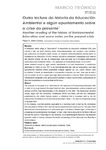Mostrar o rexistro simple do ítem
Outra lectura da historia da educación ambiental e algún apuntamento sobre a crise do presente
| dc.contributor.author | Meira Cartea, Pablo Ángel | |
| dc.date.accessioned | 2011-07-12T10:20:34Z | |
| dc.date.available | 2011-07-12T10:20:34Z | |
| dc.date.issued | 2009 | |
| dc.identifier.citation | Ambientalmente Sustentable, 2009, 8: 15-43. ISSN: 1887-2417 | es_ES |
| dc.identifier.issn | 1887-2417 | |
| dc.identifier.uri | http://hdl.handle.net/2183/7411 | |
| dc.description.abstract | [Resumo] A finalidade deste artigo é “deconstruír” a traxectoria da educación ambiental (EA) para intentar ir alén da visión histórica lineal, descontextualizada, sen suxeitos e sen conflitos, que predomina na literatura deste campo. As versións institucionalizadas adoitan partir da Conferencia de Estocolmo (1972) e rematar coa última celebración consagrada polo sistema das Nacións Unidas, fito que lle corresponde, hoxe por hoxe, ao IV Congreso Internacional sobre Educación Ambiental Tbilisi + 30, celebrado en Ahmedabad (India), no ano 2007. Neste itinerario ocupa un lugar central, equivalente a un mito fundacional, a conferencia celebrada en Tbilisi no ano 1977 e as recomendacións que nela se propuxeron. Con esta aproximación histórico-crítica preténdese achegar algunha luz –ou, cando menos, unha luz distinta– á tarefa de desentrañar e comprender a suposta –ou real– crise que se está a vivir no campo da EA e o papel que xoga nesta conxuntura o mito de Tbilisi. Como recurso metodolóxico adóptase unha aproximación analítica a medio camiño entre a arqueoloxía do discurso foucaultiana e a socioanálise de Bourdieu. | es_ES |
| dc.description.abstract | [Abstract] The purpose of this paper is to “deconstruct” the trajectory of Environmental Education (EE) in order to try to go beyond the lineal historical view, decontextualized, without subjects and without conflicts, that predominates in the literature on this field. The institutional versions usually begin with the Stockholm Conference (1972) and finish with the last celebration established by the United Nations system, a milestone that is nowadays held by the 4th International Conference on Environmental Education Tbilisi + 30, held in Ahmedabad (India) in the year 2007. In this itinerary, a central position, equivalent to a founding myth, is held by the conference that took place in Tbilisi in 1977 and the recommendations that came out of it. The goal of this historical and critical approach is to shed some light -or at least a different light- on the task of unraveling and understanding the alleged -or real- crisis that is being felt in the field of EE and the role the myth of Tbilisi plays in this situation. As a methodological resource, the analytical approach taken is halfway between Foucault’s archaeology of the discourse and Bourdieu’s social analysis. | es_ES |
| dc.language.iso | glg | es_ES |
| dc.publisher | Universidade da Coruña | es_ES |
| dc.subject | Educación ambiental | es_ES |
| dc.subject | Historia da educación ambiental | es_ES |
| dc.subject | Tbilisi | es_ES |
| dc.subject | Environmental education | es_ES |
| dc.subject | Environmental education's history | es_ES |
| dc.title | Outra lectura da historia da educación ambiental e algún apuntamento sobre a crise do presente | es_ES |
| dc.type | info:eu-repo/semantics/article | es_ES |
| dc.rights.access | info:eu-repo/semantics/openAccess |






